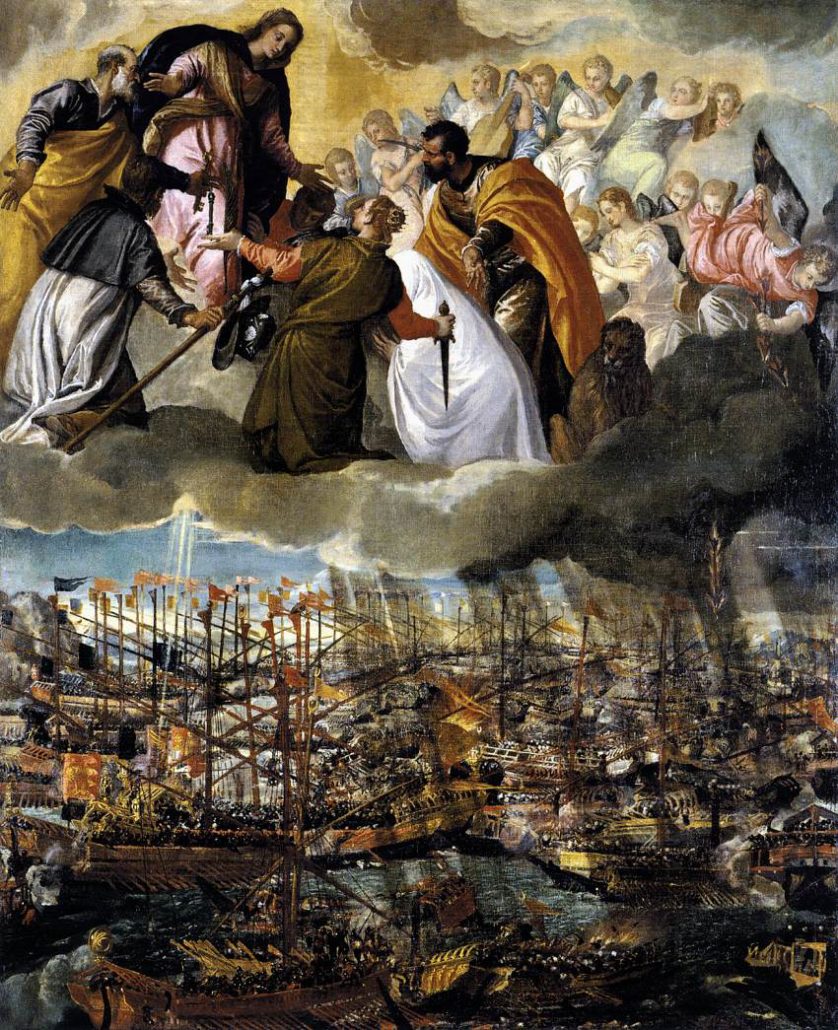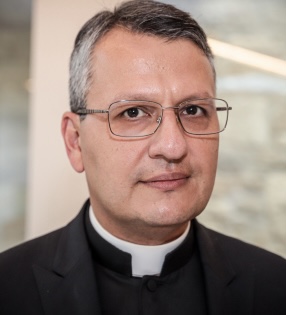The Feast of the Holy Rosary and the Defeat of the Ottomans: A Day to Remember

Today October 7 marks the 450th anniversary of the institution of the Feast of the Holy Rosary. Originally called “Our Lady of Victory,” Pope St. Pius V in 1571, wanted to commemorate the Christian victory over the Ottoman Turks at the Battle of Lepanto, which eventually secured Christian Europe from an inevitable Islamic takeover.
At the inception of Islam in 622 AD, the “Prophet” Muhammad set out from Medina to conquer the whole Christian world for Allah by force.
The Beginning of Islamic Conquests
Dr. Bill Warner, founder of The Study for Political Islam, explains that Muhammad established a new unified polity in the Arabian Peninsula which under the subsequent Rashidun and Umayyad Caliphates saw a century of rapid expansion In other words, they drew first blood.
Some of military campaigns initiated by Muslims and willfully omitted on the part of revisionists were:
- The siege of Jerusalem (636-637) was part of the Muslim conquest of the Levant and the result of the military efforts of the Rashidun Caliphate, under the command of Abu Ubaidah, besieged Jerusalem beginning in November 636. After six months, the Patriarch Sophronius agreed to surrender.
- The Battle of Tours (732) when Muslims invaded France, only to be met and pushed back by Charles Martel.
- The Islamic Sack of Rome (846) when the Muslim Arabs (then called Saracens in Europe) after they had rapaciously invaded Christendom through Southern Italy which they succeeded in conquering by fire, murder, rapine and the sword, who invaded Rome and looted the liturgical treasures of the Basilicas of St. Peter and Saint Paul Outside the Walls. The most important among them were the golden cross erected above the tomb of Peter, the so-called Pharum Hadriani, and the silver table donated to the church by Charlemagne, and adorned with a representation of Constantinople.
Within a few centuries, the jihadists had occupied and pillaged every Christian capital of the Middle East, from Antioch through North Africa and Spain. The popes of the Catholic Church, in an effort to both retake Jerusalem and halt the ongoing Islamic threat, called for the Crusades.
Christendom Responds
The First Crusade was called by Pope Urban II in 1095. It came at the behest of the Byzantine Emperor Alexius I Comnenus who appealed to the pope in Rome for assistance to turn back the Muslim Turks, who were invading what is now Turkey; they took property as they went, turned churches into mosques, and forced Christians to convert to Islam. Approximately two-thirds of the ancient Christian world had been already conquered by Muslims by the end of the 11th century. It was also that time that the Church of the Holy Sepulcher, the place traditionally held where Jesus Christ was buried, was destroyed by Abu ‘Ali Mansur. Soon thereafter all Christian pilgrimages to the Holy Land were cut off by Muslims. While Mansur did not attack Christendom directly, he demonstrated scorn for the religion, in addition to destroying 30,000 churches in the Middle East. Eventually, the Muslims had their ultimate triumph over Christendom and civilization with their conquest of Constantinople in 1453.

Following this period, the Catholic Church’s actions directed specifically against Islam decreased because of of the Protestant Reformation in 1517, which was funded in part by the Ottomans as a means to further weaken a divided Christendom. The Islamic-Turkish onslaught eventually prevailed in 1526, when the Sultan Suleiman I — also known as Suleiman the Magnificent — sacked Hungary. He and his one hundred thousand soldiers would have equally conquered the Hapsburg city of Vienna in 1529, had drastic weather not prevented them from breaching the city walls. The Ottomans would eventually retreat and regroup to fight another day.
By the 14th century the Ottoman Turks had firmly established themselves in the Balkans and would penetrate deeper into Europe despite repeated efforts to repulse them. When the Ottoman navy, the most powerful in the world at its time, threatened to overrun Christendom decades later, Pope Pius V organize for a Holy League — a coalition of Catholic powers which included Genoa, Spain, Venice, and the Papal States under the military leadership of Don John of Austria — to confront the Ottomans in 1571 at Lepanto. They won a resounding victory that permanently disabled the Ottoman Empire’s absolute dominance of the Mediterranean.
Pius V attributed the victory at Lepanto — one of the most decisive in all of naval history according to historians — to the intercession of the Blessed Virgin Mary as he pleaded with every man, woman, and child to pray the Rosary for the League’s success. The Muslim Ottoman Empire, which had been expanding into Europe for 900 years, was finally stopped. And while the Ottomans still held unto their empire, their military expansions began to diminish after Lepanto. Their jihadist threat was essentially suppressed when the founder of modern Turkey, Mustafa Kemal Atatürk, eliminated the caliphate in 1924 and secularized his country.
Jihad is not a Myth
Pope Francis in 2013 declared: “Faced with disconcerting episodes of violent fundamentalism, our respect for true followers of Islam should lead us to avoid hateful generalizations, for authentic Islam and the proper reading of the Quran are opposed to every form of violence.”
Contrary to revisionists and Muslim apologists, the Islamic conquests are well documented:
- Ibn Ishaq’s (d. 767) Sira Rasul Allah (“Life of Muhammad”), the oldest biography of Muhammad;
- Waqidi’s (d. circa. 820);
- Maghazi (“Military Campaigns [of the Prophet]”);
- Baladhuri’s (d. 892) Futuh al-Buldan (“Conquests of the Nations”);
- Tabari’s (d.923) multi-volume Tarikh al-Rusul wa al-Muluk, (“History of Prophets and Kings”), which is 40 volumes in the English translation.
It should be pointed out that, to Muslims, the Islamic conquests are seen as acts of altruism. They are referred to as futuh, which literally means “openings,” i.e., the lands they conquered were “opened” for the light of Islam to enter and guide its infidel inhabitants.
As explained in Islam: Religion of Peace? – The Violation of Natural Rights and Western Cover-Up, Islamic terrorists and their supporters who try to enforce the Islamic mandate of a global caliphate claim that they are simply complying with what the Prophet taught. This is sustained by Islamic jurisprudence which teaches that since the land to which Muslims have migrated becomes their own, terrorism is rationalized under fard ayn in order to keep society pure.
As Raymond Ibrahim explains, to Muslims, there is nothing to regret or apologize for concerning the conquests; they are seen as for the good of those who were conquered (i.e., the ancestors of today’s Muslims). And this is something that should never be forgotten.
___________________________________________

Mario Alexis Portella is a priest of the Cathedral of Santa Maria del Fiore and Chancellor of the Archdiocese of Florence, Italy. He has a doctorate in canon law and civil law from the Pontifical Lateran University in Rome; he also holds a M. A. in Medieval History from Fordham University, as well as a B.A. in Government & Politics from St. John’s University. He is also author of Islam: Religion of Peace? – The Violation of Natural Rights and Western Cover-Up.

Book available on Amazon, Barnes & Noble and WestBow Press.





Recent Comments